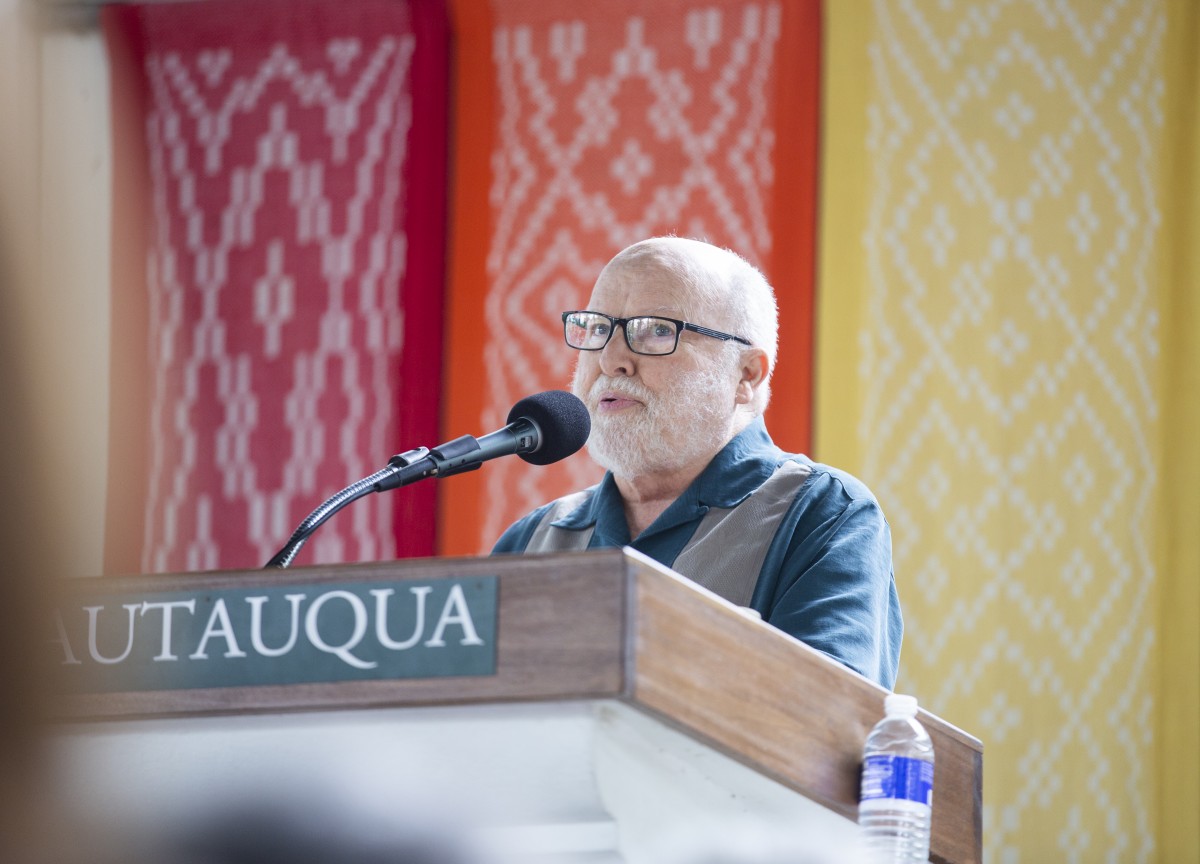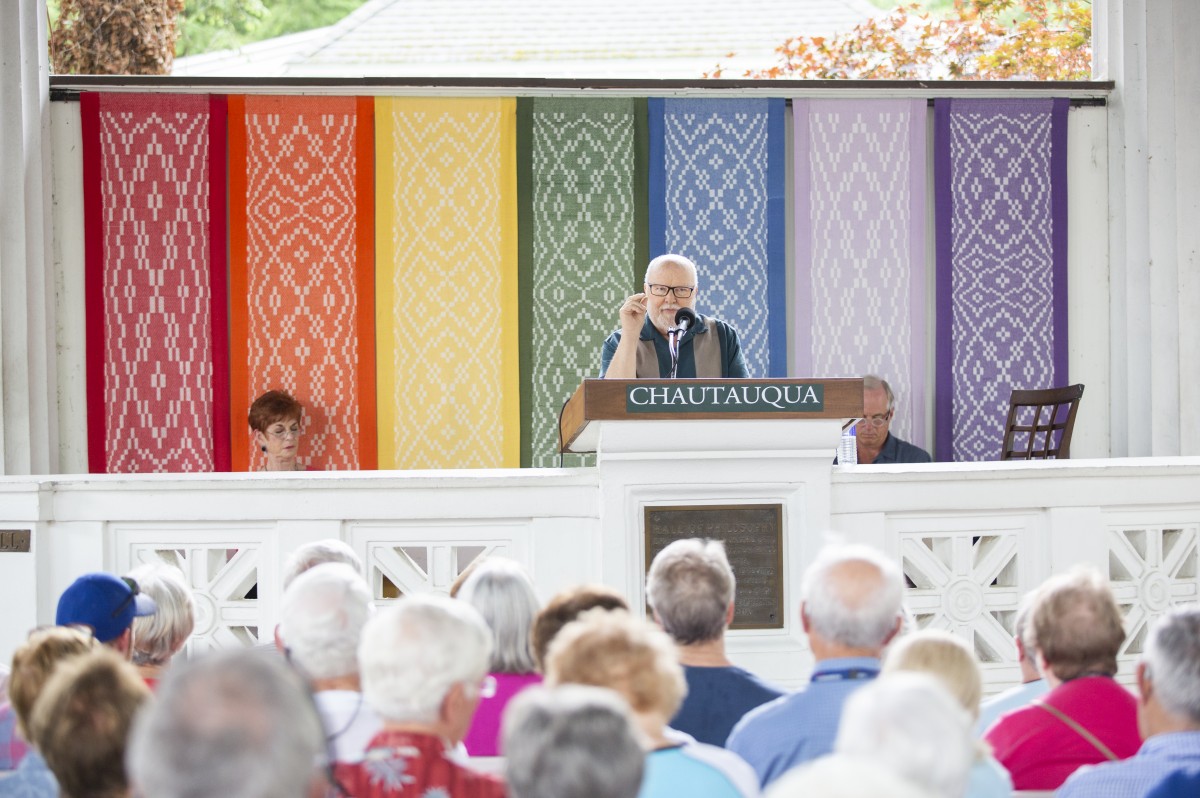Throughout the first half of people’s lives, they are confronted with problems that they realize — in the second half of their lives — are unsolvable, according to Carl Jung, one of Fr. Richard Rohr’s top five favorite teachers.
“Your heart just drops because we Americans are problem solvers,” Rohr said. “But that’s one of the things you go and … learn by the second half of life. A lot of the so-called ‘problems’ you thought were yours to solve are yours to hold.”
This week, Rohr, Franciscan priest of the New Mexico Province and founder of the Center for Action and Contemplation in Albuquerque, New Mexico, began his lecture series in the Hall of Philosophy as part of Week Four’s interfaith theme, “Falling Upward: A Week with Richard Rohr.” His first lecture, presented on Monday, was titled “The First Half of Life.”
During his lecture, Rohr discussed the stages within the first half of life and the growth one experiences during that time.
Rohr began by quoting Julian of Norwich: “First, there is the fall. Then, there is the recovery from the fall, and both are the mercy of God.”
Despite his education, in which Rohr was taught to behave as flawlessly as possible, he said the trials one faces are what help transform them; what help them grow. Rohr even went as far as to question the worth of the New Testament if it is not “transformational.”
“No wise person has ever wanted to be younger,” says Rohr.
— The Chautauquan Daily (@chqdaily) July 16, 2019
“If the stories of the New Testament are not transformational — I’m going to say it — what good are they?” Rohr said. “Jesus came to make us aware, teach us how to love, teach us how a new form of consciousness that I call ‘nondual’ or ‘contemplative consciousness.’ But, we just made the Gospel largely a set of things to believe; (it) became more a matter of willpower.”
But willpower will not allow someone to transform, according to Rohr. He said willpower “represses most of your feeling world — most of your spiritual intelligence.”
Rohr said the first stage of the first half of life is developing an ego. One must be able to create an identity, or a sense of self, to continue in life. While creating that identity, Rohr also said that one cannot look to another and compare in a way that demeans the other, or puts them in the wrong.
“You have to know who you are and know who you aren’t,” Rohr said. “Now, if you stay right there in the first half of life, just defining who you are against who you aren’t, you have the politics we have today; defining precisely why the other group is wrong. … They’ll define identity and boundary, but not oppositional boundary, not oppositional identity. And that, we call growing up.”
Rohr, referring to Ken Wilber, said the second stage of the first half of life is “growing up.” In this stage, one learns about relationships, Rohr said. One learns how relationships work and how they don’t; how to communicate and how not to; and about power differentials.
“It’s brought a great deal of — in my opinion — smarts to our time, but as we know, a great deal of conflict and confusion,” Rohr said. “We all don’t agree on the power differentials, the communication styles or whatever else it might be.”
“Maybe a lot of you have received a prophecy… in the middle of life you heard but have forgotten,” says Rohr.
— The Chautauquan Daily (@chqdaily) July 16, 2019
When it comes to conflict, Rohr said that one must also be careful of people who say, “That’s just psychology.” Rohr said that people who say things like this aren’t to be trusted, because there is no wisdom in that type of thinking. Those who say that “it’s only Scripture” cannot offer reliable information because this way of thinking does not align with what is truly wise.
“That gets back to my basic principle; if it’s true (in one place), it’s true everywhere,” Rohr said. “Wisdom is when different sciences and arts validate, confirm, regulate and challenge one another. And when you see them all challenge or affirm one another, that’s what I mean by the perennial tradition. Truths that just keep recurring religion after religion, century after century. That has to come from the collective unconscious, or (what) we who are Christian would call the Holy Spirit.”
Rohr again quoted Wilber, referring to the third stage, which is called “waking up.” Waking up is “radically overcoming your sense of separation.” People separate themselves from God, their neighbors, their enemies — this is something that must be acknowledged and overcome.
One must not see themselves as separate from these other beings. Everyone is connected.
Without understanding this, Rohr said people are stuck in the second stage of growing up.
Rohr said that the last two stages, “waking up” and “showing up,” are about deconstructing the first two stages because those stages, though important, “do not lead one to love.”
“God just led you to love yourself and be judgmental of everybody else, but those are only painful bits of self knowledge that you can’t bear before your 50s,” Rohr said.
Rohr said this is where the final stage of “showing up” plays a major role. To deconstruct what one has worked on in the first two stages, one must also give back. He said that there are many who simply show up without genuinely, generously giving back to others.
The problem, Rohr said, is that many struggle with these last two steps because people do not want to let go of the identity they have worked to create.
“We were trained to attend (and) we all turn it into various forms of transaction so we don’t have to transform our consciousness, our heart, our mind; all the things that matter,” Rohr said.
“If you don’t have self confidence at that early level (of life), you don’t have self confidence,” @RichardRohrOFM
— The Chautauquan Daily (@chqdaily) July 16, 2019
Rohr said that a profession and a persona are things that must be let go of at this stage to completely give back, like the disciples whom Jesus challenged to leave their “fathers and their nets.” This isn’t a bad thing, Rohr said, but it is difficult.
“The two things that most keep you back from, what I call in Falling Upward, ‘the further journey,’ is you’ve spent so much time investing in the first journey, you’re not about to let go of it — our occupation, our persona, our self-image,” Rohr said. “The better it is (and) the more admired it is, the harder it is to let go of.”
Rohr said that in the first two stages, one learns how to be so successful; that life becomes a game of win-lose where one wins at the cost of another’s loss.
This has almost developed into a culture of the first half of life, according to Rohr. After age 30, though, Rohr claimed that one doesn’t learn to succeed without failure.
This success can make an ego grow so big that it solidifies itself, unwilling to be deconstructed for one to “wake up” and “show up.” Rohr said that the ego can grow so large that the Gospel becomes something that it is not.
“The Gospel itself became the Gospel of being right,” Rohr said. “Jesus did not say, ‘thou shall be right,’ ” Rohr said. “He praised faith, which is the balancing of knowing with not knowing, and not needing to know. When you can be happy, even being wrong, that’s when you’re free. Because then frankly, you can be honest.”
All of this work from constructing to deconstructing, Rohr said, is called “building your tower, and then climbing your tower and planting your flag on the top.” This does not save the world, though, Rohr said.
“This cannot be sustained, this success for very few as we defined success,” Rohr said. “But I was lucky enough for many years to give retreats in so many developing countries, where I see success defined in such different, almost shocking ways that weren’t our way, but they worked,” Rohr said. “In fact, it appeared to create even happier people.”
Rohr said he would continue with these themes during Tuesday’s lecture, “The Transition.”







